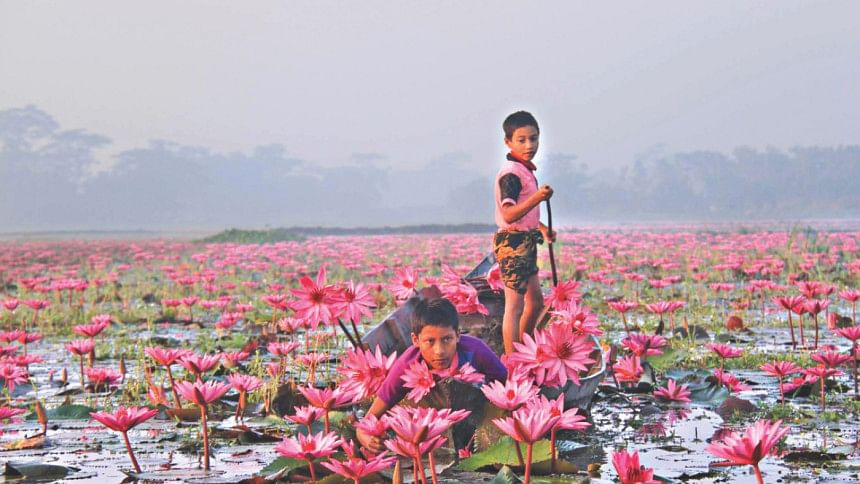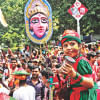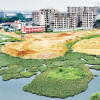Celebration of life at a Barisal Lake

Sometimes nature whispers of fragility or interconnectedness. Sometimes it offers contemplation in moments of deep silence. At other times nature shouts. When the thousands of waterlilies bloom on the lake in Barisal known as Shaplar Beel, “Lake of the Waterlilies,” nature reminds in loud announcement that life is a great celebration.
Every year at this time the landscape which lies 60 kilometres from Barisal city is transformed into a blaze of pink. It's a grand visual festival begun...
Children's smiles are broad and unstoppable then, as they move about in country boats collecting delicate petal parcels. A boy clutches a bundle of lily stems triumphantly. A girl tries out a blossom as adornment for her hair...
For adults too, the floral display on the waterhole which borders Satla village in Barisal's Ujirpur upazila and Bagda and Khajuria villages in adjacent Agailjhara upazila and stretches over a thousand hectares, by local estimate, can only bring delight.
“Nobody knows the lake's history,” says an elderly man, “But since childhood I have seen waterlilies blossom here. It's really enjoyable.” The lake hosts species that flower in white and purple too.
Traditionally the plants have offered villagers not only the radiant beauty of their flowers but a source of income. Many collect waterlilies still, for sale as a vegetable in local markets.
“Most of the year I sell lilies from this lake,” says Abul Jabbar of Bagda village. “I can get up to five taka per bundle of twenty stems, which gives a daily income of around 250 taka.” From selling waterlilies Jabbar maintains his family of seven, he says.
Like Jabbar at least a hundred other poor families rely on lilies. Shaplar Beel's lilies are sold at markets across Barisal, and as far away as Pirojpur and Faridpur.
Still others make a livelihood from fishing. “There is plenty of natural food for fish in this lake,” says fisherman Romesh Gharami of Khajuria village, “I normally achieve a good catch here.”
Walking fish, butter fish, mullet and fry are available year-round, Gharami says, bringing him an income of up to 500 taka per day from which he supports his family of five.
Yet waterlily production at the lake is on the decline, with local sources identifying siltation which is decreasing the lake's depth as a problem. Moreover some have commenced fish cultivation in the lake, building dams inside it which alter the traditional ecosystem.
But for now, life continues for the most part following tradition at Shaplar Beel, with the brilliance of its annual waterlily display in full force as usual, to welcome the winter.

 For all latest news, follow The Daily Star's Google News channel.
For all latest news, follow The Daily Star's Google News channel. 








Comments